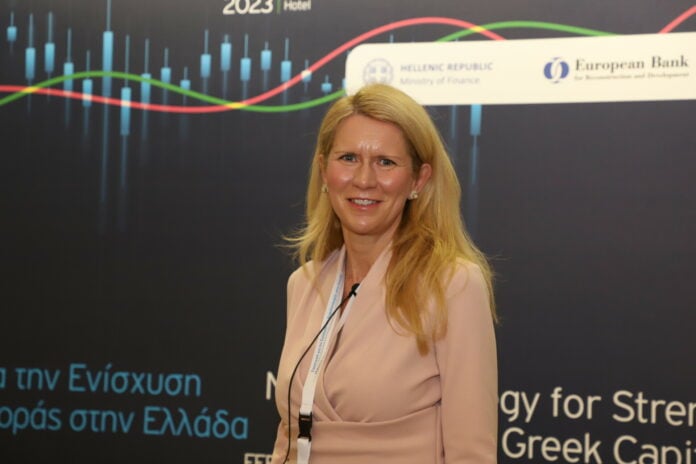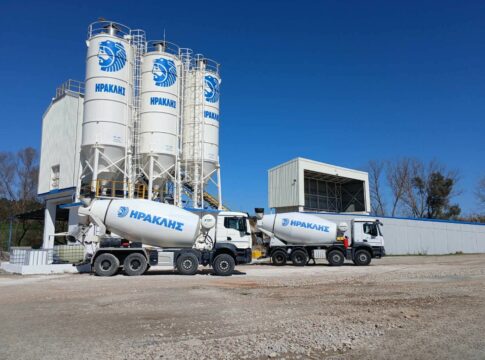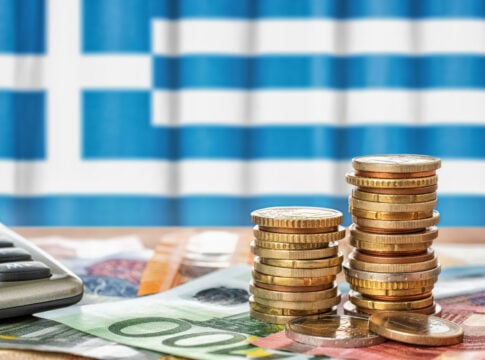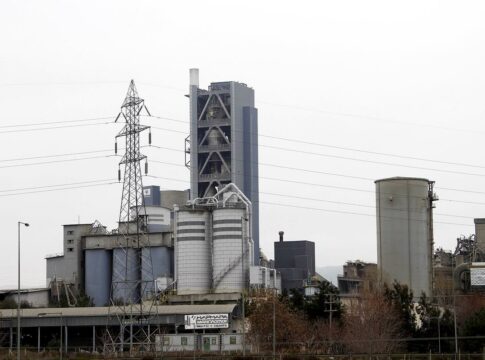The capital market is the driving force for all modern economies, Andreea Moraru, head of the EBRD for Greece and Cyprus, says in an interview with Naftemporiki, pointing out that with its development, Greek businesses have a serious alternative source of long-term financing. The EBRD has invested 1.5 billion euros in projects concerning the Greek capital market and has worked on the development of the Strategy for Strengthening the Capital Market with the Ministry of Finance and the European Commission. Andreea Moraru credits Greece for the reforms that have made it a more attractive investment destination. However she says that governance remains a weak point for Greece compared with its EU peers and further progress is needed in areas such as public administration and judicial reform.
EBRD recently downgraded its forecast for Greece’s growth this year and next. However it remains more optimistic than other institutions, like the European Commission. In this very volatile and challenging global environment, what are the factors that support Greek economy?
Greece’s prospects for economic growth are favourable in the short to medium term, notwithstanding the challenging global environment.
The country still has significant catch-up potential after the prolonged crisis during 2009-16. Successive reforms introduced under the economic adjustment programmes and during the post-programme enhanced surveillance period have stabilised the macroeconomic situation and transformed the overall business environment, making Greece a much more favourable investment destination than before.
The authorities were quick to adopt and implement a coherent plan for the EU’s Recovery and Resilience Facility, and the projects being rolled out or envisaged under this plan will continue to boost growth in the coming years.
How important is the strengthening and the development of the capital market for Greece’s medium and long term growth prospects. What would it practically mean for the country’s companies?
At the EBRD, we see capital markets as the engine of modern economies in order to mobilise capital for economic growth, while increasing transparency.
A well-functioning capital market helps companies to obtain funding and savers to achieve better returns and is thus an important factor in economic growth, wealth creation and employment.
The utilisation of capital markets and a number of different capital market instruments is critical for the mobilisation of additional capital towards sustainable development, as emphasized by the National Strategy for Strengthening the Greek Capital Market. In other words, Greek corporates will have an alternative source of long-term funding, non-reliant on bank financing.
More opportunities to finance, more opportunities to grow and support the real economy.
As EBRD, we have invested close to €6.5 billion to date in the country, with €1.5 billion, or 24% of our total activity, corresponding to capital market projects and demonstrating our strong support and prioritisation in this area, which was in the core of our internal strategy from the beginning.
The Bank has so far deployed the amounts of €670 million to back corporate bond issuances and €502 million to subscribe to bonds coming from Greek banks, while another €360 million has been invested in listed equities.
We are very pleased to have witnessed in the last couple of year a strong interest from the corporate sector towards green and sustainable linked instruments attracting impact investors in Greece.
How do you evaluate Greece’s steps towards this goal so far? What are the next steps that it is crucial for the country to make?
Greece has one of the most developed capital markets among the economies where the EBRD invests. It is an advanced market by most measures.
We are very pleased to have worked on developing the National Strategy for Strengthening the Greek Capital Market together with the Ministry of Finance and the European Commission. The Strategy marks a milestone for the Greek capital market development. It is the result of years-long efforts, and has been backed by many stakeholders including but not limited to the Athens Stock Exchange and the Hellenic Capital Markets Commission.
The finalisation of the Strategy coincides with the current great momentum and favourable environment for the Greek capital markets, the recovery of which slowly started at the time Greece became a country of operation for EBRD, in late 2015.
Since then, and despite the challenges posed by the carry over effects of the financial crisis, the post-COVID-19 pandemic recovery phase and, post-the war in Ukraine as well as other disruptions, Greek capital markets have achieved significant milestones.
All stakeholders, from the authorities to regulators, issuers and investors, should be proud for a revitalised market of listed equities currently revamped at levels last seen almost a decade ago, the establishment of a new local debt capital market with 25 corporate bond issuances to date, the return of Greek banks to the international DCMs with successful placements of several types of instruments – a prerequisite for the proper operation of the banking system; and a recurring presence of Greek corporates in the Eurobonds market, including first time issuers.
Do you think we should expect significant progress towards EU’s goal for a capital markets union? How important would the creation of a truly single market for capital across the EU be for a small market, like Greece?
From 2015 onwards, when the first Capital Market Union (CMU) Action Plan was adopted, significant progress has been made. We are proud as EBRD to have contributed to these efforts.
Together with the European Commission, the EBRD has implemented more than 30 technical assistance projects in the field of capital markets development in 10 EU Member States (funded by the European Commission’s DG REFORM).
We are actively supporting also the new CMU Action Plan adopted in 2020 in order to step up the level of ambition in making progress, where barriers to the free movement of capital still exist. Integrated capital markets are crucial for the future of the EU, not only to support with the COVID-19 recovery, but also to support the green and digital transitions.
We are confident that the Greek strategy has an important role to play in a truly strong pan-European CMU.
EBRD has been giving through its investments a vote of confidence in Greece for eight years. In the time you have been present in the country, how much has the investment environment changed? To what extent do factors such as bureaucracy, the functioning of the public administration, the speed of the judicial system facilitate or hinder the work of the EBRD today?
The investment environment in Greece has changed a lot since we started investing in the country eight years ago.
Greece has exited the EU’s enhanced surveillance procedure and has effectively implemented key reforms to strengthen the economy.
As I also mentioned before, good progress has been made so far on Greece’s Recovery and Resilience Plan, which the EBRD is also supporting with a €1 billion programme.
Ambitious climate-mitigation plans are progressing, but the global energy crisis is causing some delay. Greece’s non-performing loan (NPL) reduction remains on track, and data from the Bank of Greece show a steep fall over the past year in the ratio of non-performing exposures (NPEs) to total exposures.
All these have considerably helped improve the investment environment in the country, and have attracted more investors.
However, governance remains a weak point for Greece compared with its EU peers, and further progress is needed in areas such as public administration and judicial reform. Governance reforms should be accelerated. The digital transition plans of the government have already made a difference and are likely to accelerate the implementation of these reforms.
If you should give just one advice to Greece, what would this be?
If I should only choose one, that would be to keep advancing the green agenda. Climate change is the biggest challenge of our time and we should continue deploying all our tools in the toolbox to fight it.
Greece is a country with huge potential, and I’m glad to see that the green transition is very high on the Greek government’s agenda. This is also true for the EBRD. We are ready to support the country, as well as all our countries, in this area, dedicating more than 50% of our total investments for projects with environmental benefits.
The recent decision to step up electricity production from lignite mines as a fall-out from the energy crisis due to Russia’s invasion of Ukraine was a necessary step and many countries took similar actions. However, it also highlights the need to vigorously pursue reforms in the energy sector, including the acceleration of renewables licencing and the attraction of new investment in this area.
Backtracking on the ambitious green agenda should be strictly time-bound to meet urgent energy needs.














